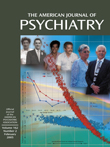Charles Darwin (1809–1882)
Best known for his theory of evolution, as presented in The Origin of Species(1), Darwin has influenced psychiatry in a number of ways. His theory revolutionalized biology and also laid the foundations for the modern study of sociobiology (2), ethology and comparative psychology (3), and child development (4). His notion of natural selection in the origins of species had a profound influence on Freud (5).
The child and grandchild of physicians, Darwin began medical training at the University of Edinburgh but never completed a medical degree. Darwin’s interest in the expression of emotions (6) led to his work on the communicative aspects of infant crying, the development of affective responses, and the “paradox of altruism” (7). In keeping detailed records of the development of his son (8), Darwin provided one of the first systematic studies of child development, and his interest in development—and the recapitulation of evolution—inspired theorists such as Ernst Haeckel and G. Stanley Hall (9). “My first child was born on December 27, 1839, and I at once commenced to make notes on the first dawn of various expressions which he exhibited, for I felt convinced, even at this early period, that the most complex and fine shades of expression must all have had a gradual and natural origin” (10). Despite recurrent medical problems (11), Darwin was an active and astute observer throughout his life; his work has had a profound influence on medicine as well as on biology and psychology.
Address correspondence and reprint requests to Dr. Volkmar, Yale University School of Medicine, Child Study Center, 230 South Frontage Rd., P.O. Box 207900, New Haven, CT 06520; [email protected] (e-mail). Portrait of Charles Darwin (Carte de visite) by Julia Margaret Cameron courtesy of the William L. Clements Library, University of Michigan.

Charles Darwin
1. Darwin C: The Origin of Species. London, Murray, 1859Google Scholar
2. Wilson EO: Sociobiology: The New Synthesis. Cambridge, Mass, Harvard University Press, 1975Google Scholar
3. Miller PH: Theories of Developmental Psychology, 3rd ed. New York, WH Freeman, 1993Google Scholar
4. Kessen W, Cahan ED: A century of psychology: from subject to object to agent. Am Sci 1986; 74:640–649Google Scholar
5. Ritvo LB: The impact of Darwin on Freud. Psychoanal Q 1974; 43:177–192Crossref, Medline, Google Scholar
6. Darwin C: The Expression of Emotions in Man and Animals. London, Murray, 1872Google Scholar
7. Campbell RL, Christopher JC: Moral development theory: a critique of its Kantian presuppositions. Dev Rev 1996; 16:1–47Crossref, Google Scholar
8. Darwin C: A biographical sketch of an infant. Mind 1877; 2:285–294Crossref, Google Scholar
9. Hogan JD: Developmental psychology: history of the field, in Encyclopedia of Psychology, vol. 3. Edited by Kazdin AE. Washington, DC, American Psychological Association, 2000, 9–13Google Scholar
10. Darwin C: The Autobiography of Charles Darwin:1809–1882 (1887). Edited by Barlow N. New York, WW Norton, 1958, pp 131–132Google Scholar
11. Bowlby J: Charles Darwin: A New Life. New York, WW Norton, 1990Google Scholar



